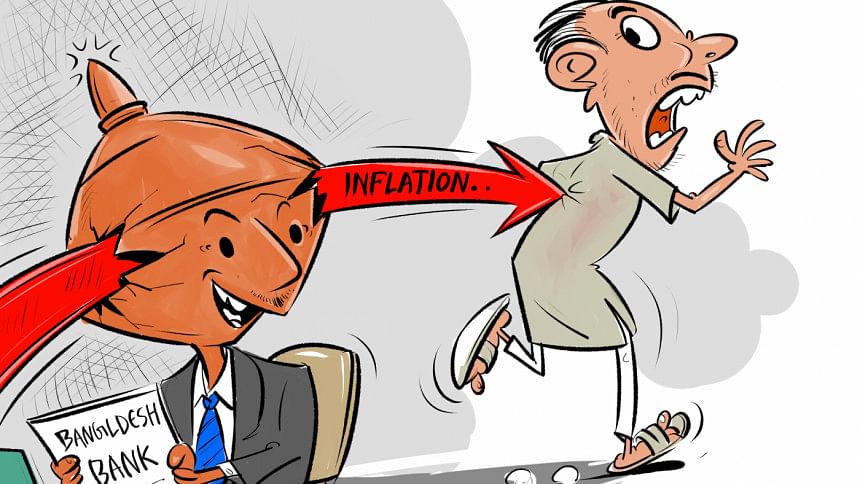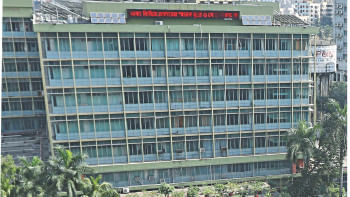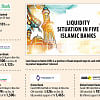New monetary policy is appropriate in direction, but inadequate in dosage

Last week, Bangladesh Bank (BB) announced the monetary policy for the second half of 2023-2024 fiscal year. Despite its positive attitude towards framing innovative steps for mitigating the decline in foreign reserves, BB suffers from several dilemmas in addressing non-performing loans (NPLs) at around 10 percent of outstanding credit and stubbornly high inflation in the vicinity of 10 percent as well.
The BB governor commented last month that 2024 will be a tough year for bank looters. That statement naturally raised some hope that a few changes were on the way. Expecting so is quite normal after the election because the clouds of uncertainty have drifted away, GDP growth is expected to be shy of six percent and businesses are back on track. There are no excuses for habitual defaulters to not pay off their loans. Since the economy is not in recession, the initial years are the peak time for any regime to be strict on governance. The new government also did not continue with the previous finance minister, who was overtly supportive of defaulters. Hence, it was naturally expected that the BB governor would take a tough stance against defaulters. But his promise appears hollow now that the new monetary policy has come to light.
In its latest monetary policy statement, the central bank introduced self-rescheduling for banks and granted the authority to write off loans as Bad and Loss after three consecutive years. This initiative is a right move towards managing NPLs. But it is not enough. BB has also started monitoring a few private banks to improve their loan management. But the actual disease is far from being remedied. All the rules and privileges delivered in the name of restructuring and rescheduling must be revised in light of the current situation. The warped definition of default loans under the guise of rescheduling is the number one culprit which must be removed from the ethics and rules of banking governance. There is no other medicine to treat the ever-increasing pandemic of defaulting.
The second problem is the unusual tardiness of the judicial solution for default litigations. Although the High Court often blasts money launderers, the existing procedural delays can never tame the growing fires of defaulting. Our Justices thunder against wilful defaulters, but their comments fail to shame the latter. A new financial court along with smart laws is essential to addressing the problem.
Though inflation began to rear its ugly face in early 2022, BB did not become serious about combatting the price spirals until June 2023. That was when the interest cap was done away with, and BB shed the shyness in terming the monetary policy as "contractionary." The interest-rate cap was replaced by a strange mechanism named SMART, keeping the end of the leash in the hands of the treasury bills and finance ministry. A staggered and weak growth of interest rates on private credit did not tame inflation effectively.
BB aims to reduce the NPL ratio to below 10 percent for state-owned commercial banks (SOCBs) and five percent for private commercial banks (PCBs) by 2026, limiting the overall NPL ratio limit to eight percent. First, monetary policy is there to address issues in the short run. So for something to be done by 2026 makes it seem like BB is engaged in a five-year plan of some kind. Second, bringing the NPL ratio down to eight percent by using the defective definition of default loans is ineffective for reducing the damage. BB must go back to the previous sensible definition of NPLs and follow the standards maintained by other emerging economies. BB's Financial Stability Report is helpful and informative, but it should include the names of notorious long-term defaulters in the appendix in order for it to seem "complete."
BB's move towards combatting inflation is appropriate in its direction but inadequate in terms of dosage. Though inflation began to rear its ugly face in early 2022, BB did not become serious about combatting the price spirals until June 2023. That was when the interest cap was done away with, and BB shed the shyness in terming the monetary policy as "contractionary." The interest-rate cap was replaced by a strange mechanism named SMART, keeping the end of the leash in the hands of the treasury bills and finance ministry. A staggered and weak growth of interest rates on private credit did not tame inflation effectively.
BB kept on raising its policy rates (repo) with lackadaisical steps that always fell behind the curve. That is not how most countries control their inflation. The move must be aggressive so as to remain ahead of the curve. A lot of dilemmas seem to have complicated and dampened BB's decisions since inflation kicked off in early 2022. Policymaking was not timely or smart.
According to BB's new monetary policy statement, the repo rate will be raised by only 25 basis points to eight percent, while the call money rate is roaming below nine percent. This shows how BB is behind the curve in terms of fighting inflation. The central bank's selective easing towards cottage, micro, small, and medium enterprises (CMSMEs), plus agriculture, is praiseworthy. But it must curb big ticket borrowers who tend to become defaulters, as history has shown us. If tycoons really need big chunks of money, let them go to the capital market which has undergone several pro-market reforms in recent years. The culture of taking high-volume, long-term loans from the banking sector must be reversed to prevent the economy from further financial turpitude in future.
Dr Birupaksha Paul is a professor of economics at the State University of New York at Cortland in the US.
Views expressed in this article are the author's own.
Follow The Daily Star Opinion on Facebook for the latest opinions, commentaries and analyses by experts and professionals. To contribute your article or letter to The Daily Star Opinion, see our guidelines for submission.

 For all latest news, follow The Daily Star's Google News channel.
For all latest news, follow The Daily Star's Google News channel. 










Comments